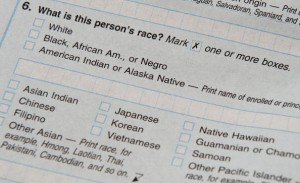
Paul J. Richards / AFP/Getty Images
The 2010 Census form had one option for "black, African American or Negro."
What do you say: “black” or “African American?” As someone who regularly writes about race and demographics, I often find myself using both terms interchangeably. But there is no clear on consensus on which term is most accurate or preferred, as Associated Press reporter Jesse Washington writes in a story this week on the debate.
Washington notes that the term “African American,” which came from the black intelligentsia, became popularized after the Rev. Jesse Jackson used it in the 1980s. Jackson told reporters at the time: “Every ethnic group in this country has a reference to some land base, some historical, cultural base. African-Americans have hit that level of cultural maturity.”
But not everyone today prefers to be called African American. According to a January 2011 The Wall Street Journal/NBC poll [PDF], 42 percent of respondents said they preferred to be called black, compared to 35 percent who preferred African American (13 percent said it didn’t matter). From Washington’s story:




